Business Law and Ethics: Analysis of Australian Consumer Law Issues
VerifiedAdded on 2021/05/27
|12
|2744
|54
Homework Assignment
AI Summary
This assignment provides a comprehensive analysis of a business law case centered around the Australian Consumer Law. The student meticulously addresses key issues, including whether transactions fall under the purview of the law, the implied guarantees breached by stores, and the remedies available for these breaches. The analysis references relevant sections of the Competition and Consumer Act 2010, definitions of 'consumer,' and case precedents like ACCC v TPG Internet Pty Ltd. The assignment examines scenarios involving defective goods, incorrect deliveries, and misleading information, ultimately concluding that the consumer, Sangita, is protected under the Australian Consumer Law and can claim remedies like refunds and compensation. The legal effects of statements made to the consumer are also assessed, highlighting the responsibilities of businesses to provide accurate information and fulfill consumer guarantees. The document effectively breaks down the legal principles, applies them to the case facts, and provides clear conclusions regarding consumer rights and potential actions.
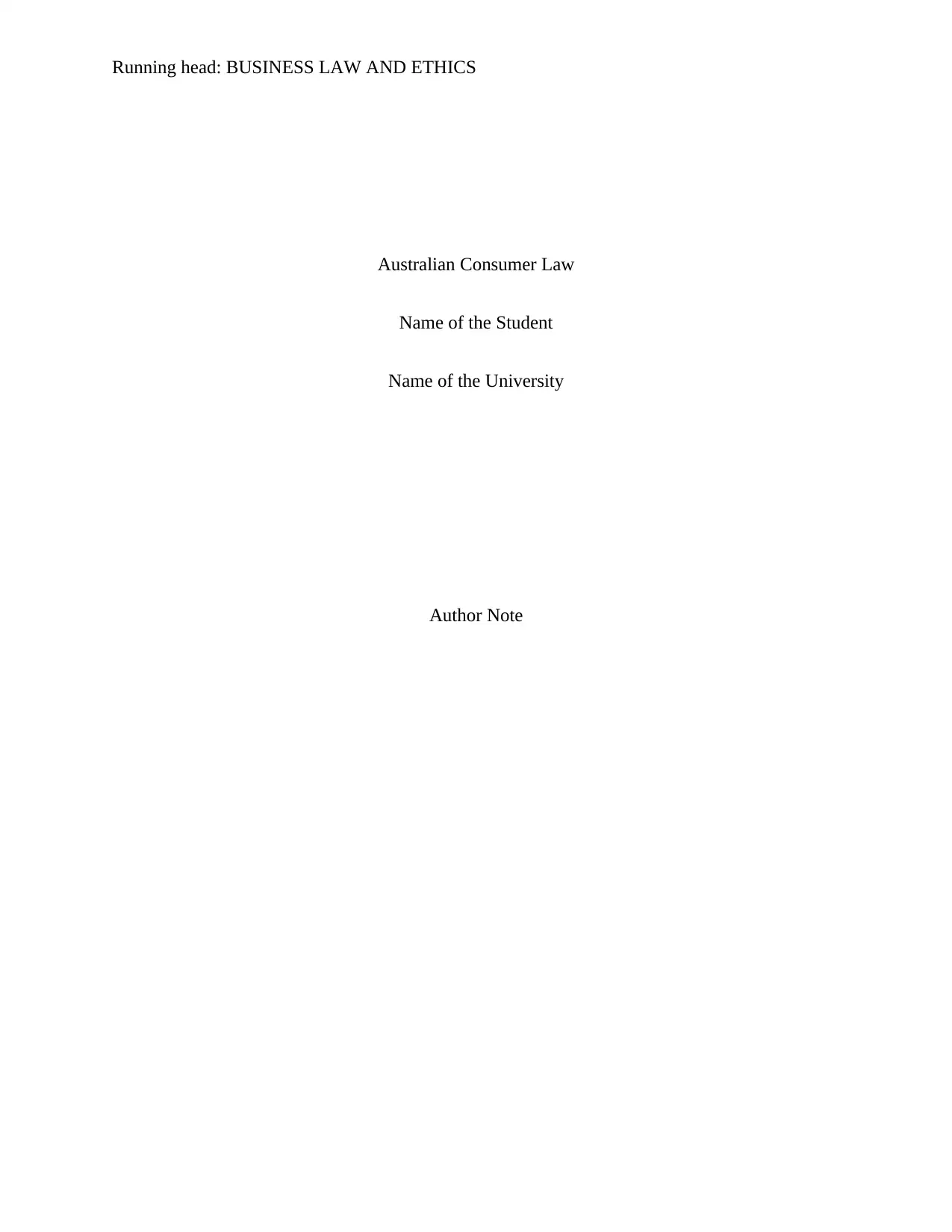
Running head: BUSINESS LAW AND ETHICS
Australian Consumer Law
Name of the Student
Name of the University
Author Note
Australian Consumer Law
Name of the Student
Name of the University
Author Note
Paraphrase This Document
Need a fresh take? Get an instant paraphrase of this document with our AI Paraphraser
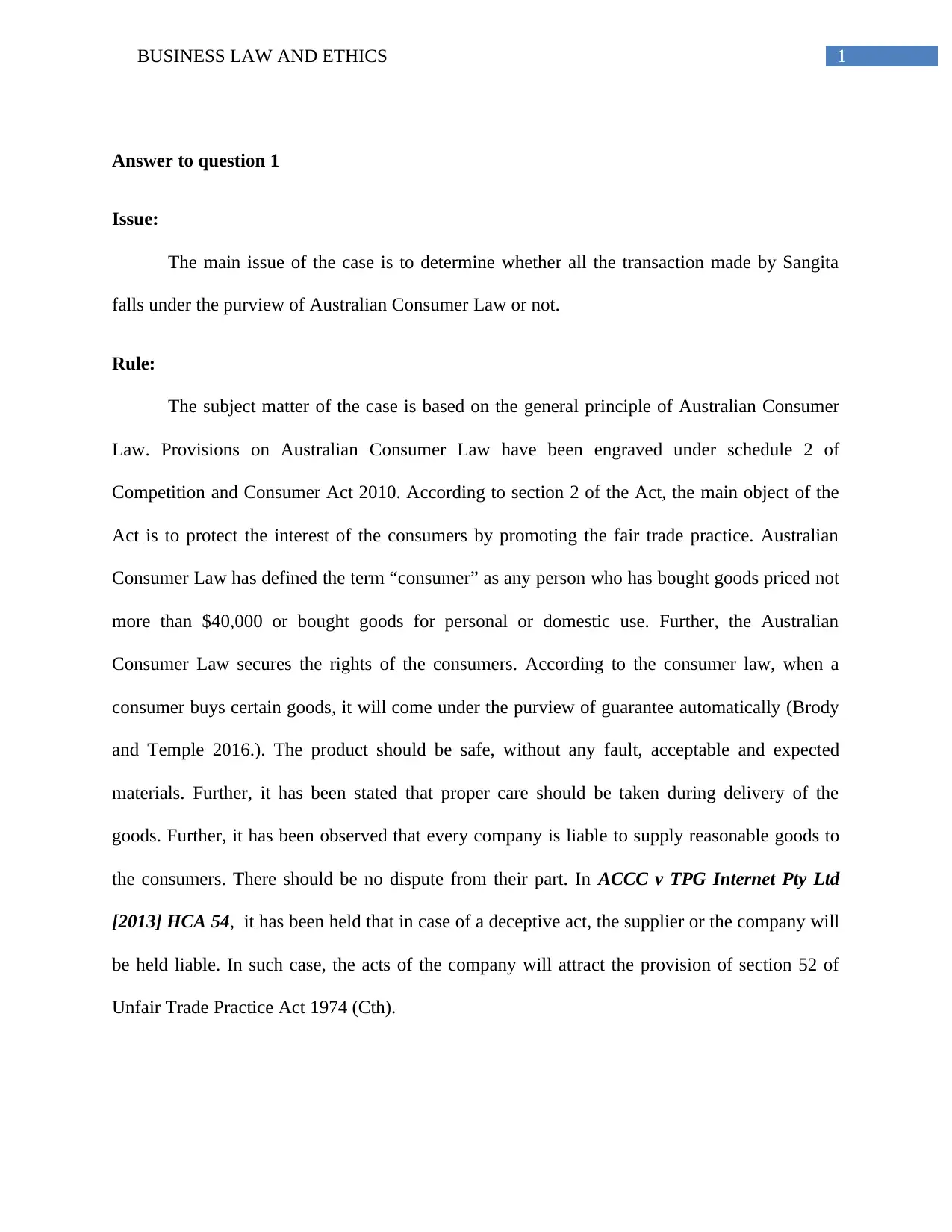
1BUSINESS LAW AND ETHICS
Answer to question 1
Issue:
The main issue of the case is to determine whether all the transaction made by Sangita
falls under the purview of Australian Consumer Law or not.
Rule:
The subject matter of the case is based on the general principle of Australian Consumer
Law. Provisions on Australian Consumer Law have been engraved under schedule 2 of
Competition and Consumer Act 2010. According to section 2 of the Act, the main object of the
Act is to protect the interest of the consumers by promoting the fair trade practice. Australian
Consumer Law has defined the term “consumer” as any person who has bought goods priced not
more than $40,000 or bought goods for personal or domestic use. Further, the Australian
Consumer Law secures the rights of the consumers. According to the consumer law, when a
consumer buys certain goods, it will come under the purview of guarantee automatically (Brody
and Temple 2016.). The product should be safe, without any fault, acceptable and expected
materials. Further, it has been stated that proper care should be taken during delivery of the
goods. Further, it has been observed that every company is liable to supply reasonable goods to
the consumers. There should be no dispute from their part. In ACCC v TPG Internet Pty Ltd
[2013] HCA 54, it has been held that in case of a deceptive act, the supplier or the company will
be held liable. In such case, the acts of the company will attract the provision of section 52 of
Unfair Trade Practice Act 1974 (Cth).
Answer to question 1
Issue:
The main issue of the case is to determine whether all the transaction made by Sangita
falls under the purview of Australian Consumer Law or not.
Rule:
The subject matter of the case is based on the general principle of Australian Consumer
Law. Provisions on Australian Consumer Law have been engraved under schedule 2 of
Competition and Consumer Act 2010. According to section 2 of the Act, the main object of the
Act is to protect the interest of the consumers by promoting the fair trade practice. Australian
Consumer Law has defined the term “consumer” as any person who has bought goods priced not
more than $40,000 or bought goods for personal or domestic use. Further, the Australian
Consumer Law secures the rights of the consumers. According to the consumer law, when a
consumer buys certain goods, it will come under the purview of guarantee automatically (Brody
and Temple 2016.). The product should be safe, without any fault, acceptable and expected
materials. Further, it has been stated that proper care should be taken during delivery of the
goods. Further, it has been observed that every company is liable to supply reasonable goods to
the consumers. There should be no dispute from their part. In ACCC v TPG Internet Pty Ltd
[2013] HCA 54, it has been held that in case of a deceptive act, the supplier or the company will
be held liable. In such case, the acts of the company will attract the provision of section 52 of
Unfair Trade Practice Act 1974 (Cth).
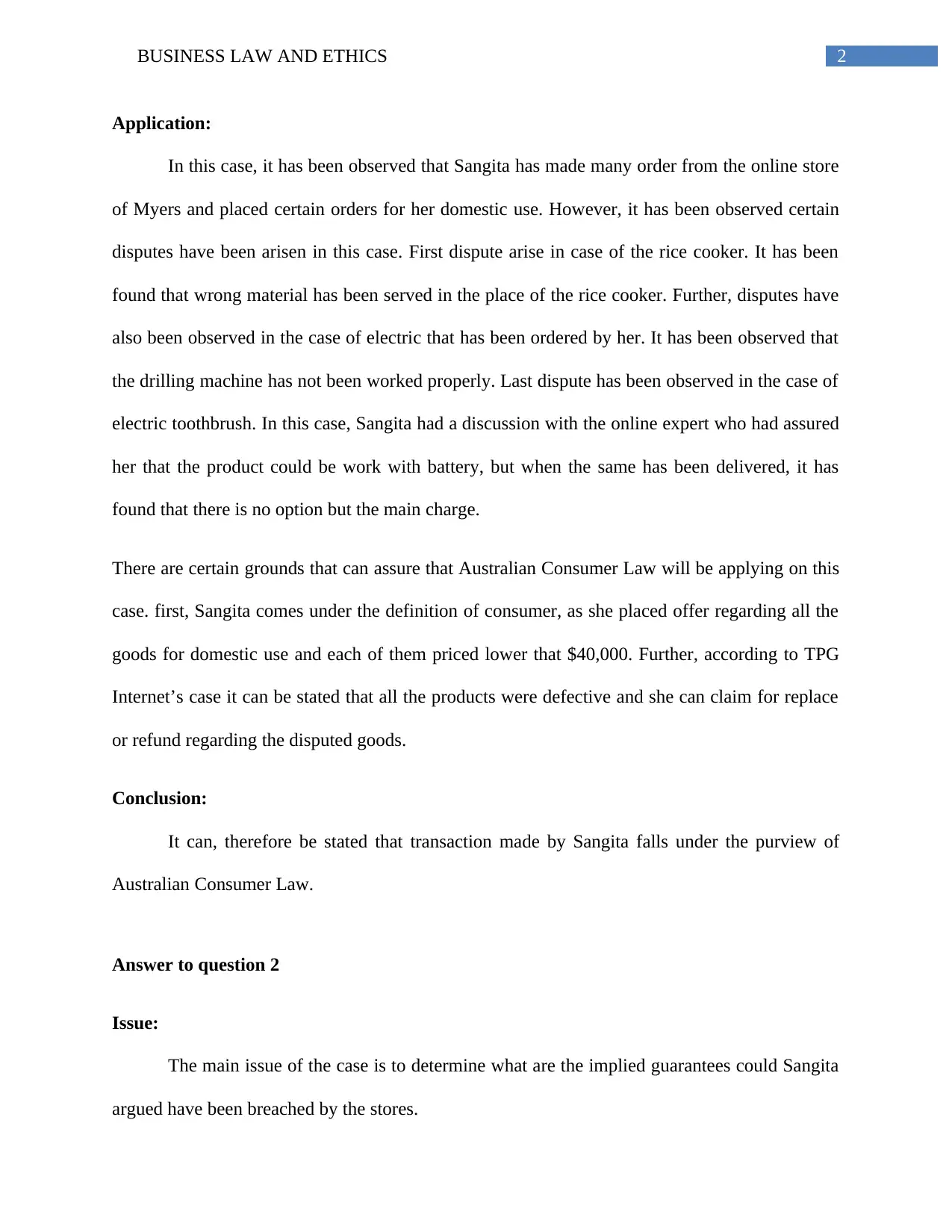
2BUSINESS LAW AND ETHICS
Application:
In this case, it has been observed that Sangita has made many order from the online store
of Myers and placed certain orders for her domestic use. However, it has been observed certain
disputes have been arisen in this case. First dispute arise in case of the rice cooker. It has been
found that wrong material has been served in the place of the rice cooker. Further, disputes have
also been observed in the case of electric that has been ordered by her. It has been observed that
the drilling machine has not been worked properly. Last dispute has been observed in the case of
electric toothbrush. In this case, Sangita had a discussion with the online expert who had assured
her that the product could be work with battery, but when the same has been delivered, it has
found that there is no option but the main charge.
There are certain grounds that can assure that Australian Consumer Law will be applying on this
case. first, Sangita comes under the definition of consumer, as she placed offer regarding all the
goods for domestic use and each of them priced lower that $40,000. Further, according to TPG
Internet’s case it can be stated that all the products were defective and she can claim for replace
or refund regarding the disputed goods.
Conclusion:
It can, therefore be stated that transaction made by Sangita falls under the purview of
Australian Consumer Law.
Answer to question 2
Issue:
The main issue of the case is to determine what are the implied guarantees could Sangita
argued have been breached by the stores.
Application:
In this case, it has been observed that Sangita has made many order from the online store
of Myers and placed certain orders for her domestic use. However, it has been observed certain
disputes have been arisen in this case. First dispute arise in case of the rice cooker. It has been
found that wrong material has been served in the place of the rice cooker. Further, disputes have
also been observed in the case of electric that has been ordered by her. It has been observed that
the drilling machine has not been worked properly. Last dispute has been observed in the case of
electric toothbrush. In this case, Sangita had a discussion with the online expert who had assured
her that the product could be work with battery, but when the same has been delivered, it has
found that there is no option but the main charge.
There are certain grounds that can assure that Australian Consumer Law will be applying on this
case. first, Sangita comes under the definition of consumer, as she placed offer regarding all the
goods for domestic use and each of them priced lower that $40,000. Further, according to TPG
Internet’s case it can be stated that all the products were defective and she can claim for replace
or refund regarding the disputed goods.
Conclusion:
It can, therefore be stated that transaction made by Sangita falls under the purview of
Australian Consumer Law.
Answer to question 2
Issue:
The main issue of the case is to determine what are the implied guarantees could Sangita
argued have been breached by the stores.
⊘ This is a preview!⊘
Do you want full access?
Subscribe today to unlock all pages.

Trusted by 1+ million students worldwide
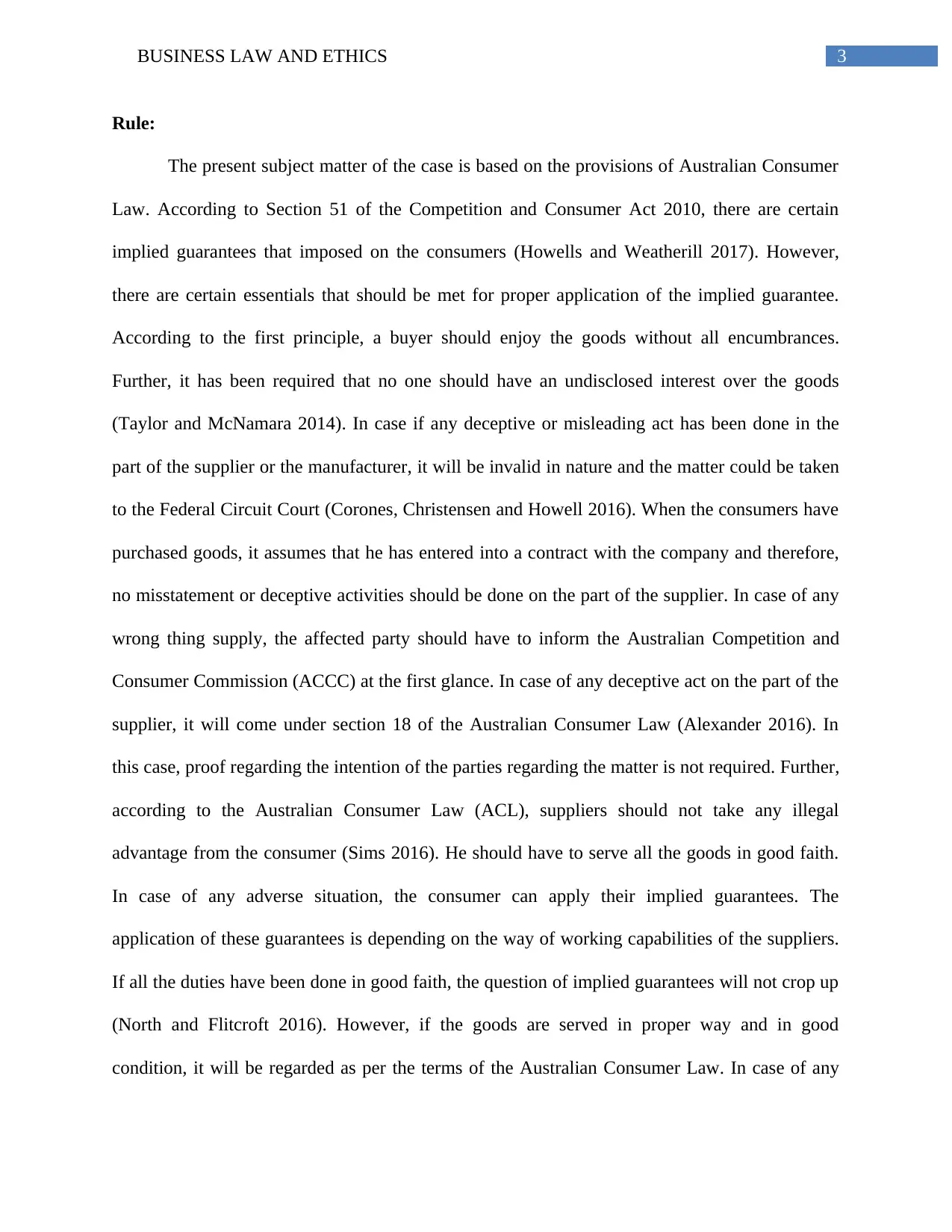
3BUSINESS LAW AND ETHICS
Rule:
The present subject matter of the case is based on the provisions of Australian Consumer
Law. According to Section 51 of the Competition and Consumer Act 2010, there are certain
implied guarantees that imposed on the consumers (Howells and Weatherill 2017). However,
there are certain essentials that should be met for proper application of the implied guarantee.
According to the first principle, a buyer should enjoy the goods without all encumbrances.
Further, it has been required that no one should have an undisclosed interest over the goods
(Taylor and McNamara 2014). In case if any deceptive or misleading act has been done in the
part of the supplier or the manufacturer, it will be invalid in nature and the matter could be taken
to the Federal Circuit Court (Corones, Christensen and Howell 2016). When the consumers have
purchased goods, it assumes that he has entered into a contract with the company and therefore,
no misstatement or deceptive activities should be done on the part of the supplier. In case of any
wrong thing supply, the affected party should have to inform the Australian Competition and
Consumer Commission (ACCC) at the first glance. In case of any deceptive act on the part of the
supplier, it will come under section 18 of the Australian Consumer Law (Alexander 2016). In
this case, proof regarding the intention of the parties regarding the matter is not required. Further,
according to the Australian Consumer Law (ACL), suppliers should not take any illegal
advantage from the consumer (Sims 2016). He should have to serve all the goods in good faith.
In case of any adverse situation, the consumer can apply their implied guarantees. The
application of these guarantees is depending on the way of working capabilities of the suppliers.
If all the duties have been done in good faith, the question of implied guarantees will not crop up
(North and Flitcroft 2016). However, if the goods are served in proper way and in good
condition, it will be regarded as per the terms of the Australian Consumer Law. In case of any
Rule:
The present subject matter of the case is based on the provisions of Australian Consumer
Law. According to Section 51 of the Competition and Consumer Act 2010, there are certain
implied guarantees that imposed on the consumers (Howells and Weatherill 2017). However,
there are certain essentials that should be met for proper application of the implied guarantee.
According to the first principle, a buyer should enjoy the goods without all encumbrances.
Further, it has been required that no one should have an undisclosed interest over the goods
(Taylor and McNamara 2014). In case if any deceptive or misleading act has been done in the
part of the supplier or the manufacturer, it will be invalid in nature and the matter could be taken
to the Federal Circuit Court (Corones, Christensen and Howell 2016). When the consumers have
purchased goods, it assumes that he has entered into a contract with the company and therefore,
no misstatement or deceptive activities should be done on the part of the supplier. In case of any
wrong thing supply, the affected party should have to inform the Australian Competition and
Consumer Commission (ACCC) at the first glance. In case of any deceptive act on the part of the
supplier, it will come under section 18 of the Australian Consumer Law (Alexander 2016). In
this case, proof regarding the intention of the parties regarding the matter is not required. Further,
according to the Australian Consumer Law (ACL), suppliers should not take any illegal
advantage from the consumer (Sims 2016). He should have to serve all the goods in good faith.
In case of any adverse situation, the consumer can apply their implied guarantees. The
application of these guarantees is depending on the way of working capabilities of the suppliers.
If all the duties have been done in good faith, the question of implied guarantees will not crop up
(North and Flitcroft 2016). However, if the goods are served in proper way and in good
condition, it will be regarded as per the terms of the Australian Consumer Law. In case of any
Paraphrase This Document
Need a fresh take? Get an instant paraphrase of this document with our AI Paraphraser
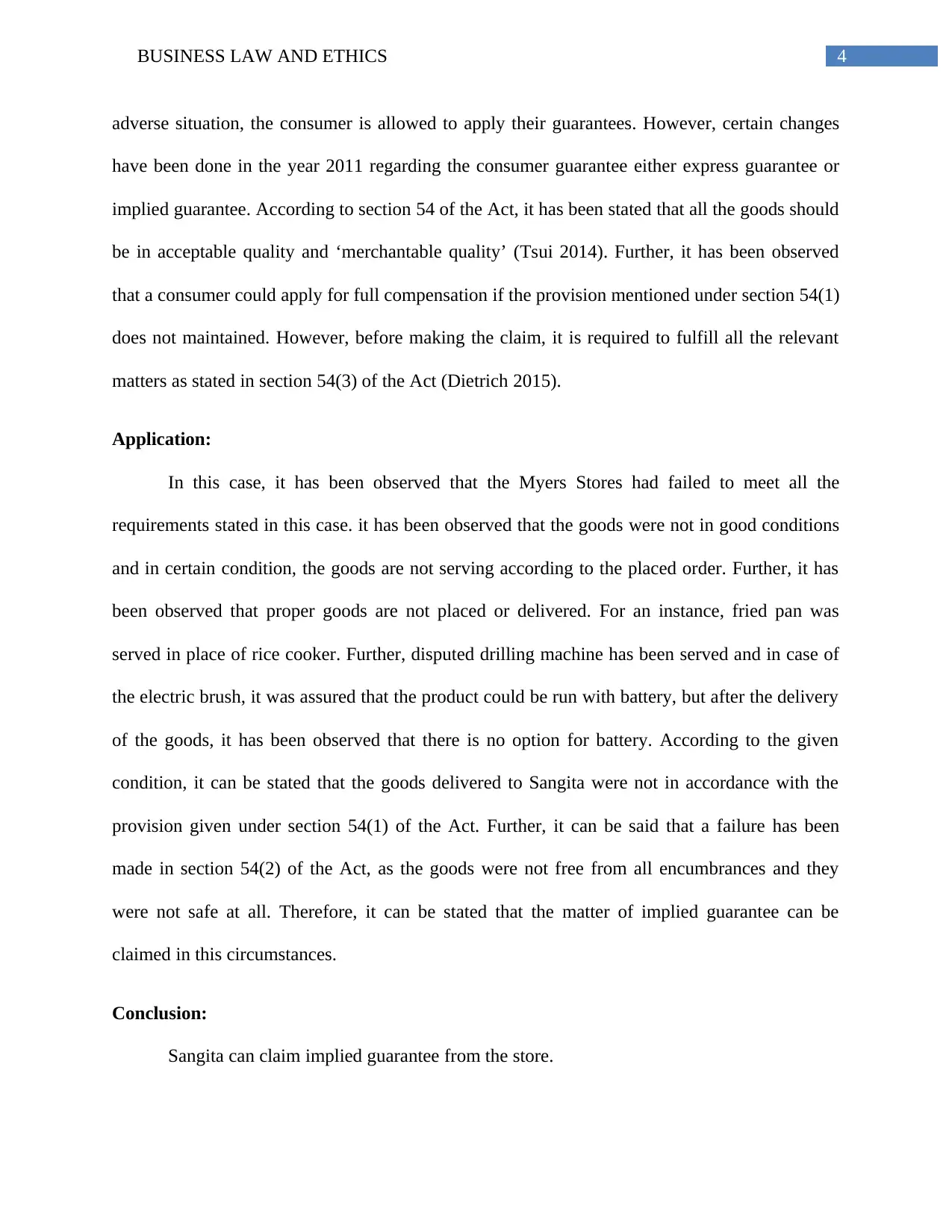
4BUSINESS LAW AND ETHICS
adverse situation, the consumer is allowed to apply their guarantees. However, certain changes
have been done in the year 2011 regarding the consumer guarantee either express guarantee or
implied guarantee. According to section 54 of the Act, it has been stated that all the goods should
be in acceptable quality and ‘merchantable quality’ (Tsui 2014). Further, it has been observed
that a consumer could apply for full compensation if the provision mentioned under section 54(1)
does not maintained. However, before making the claim, it is required to fulfill all the relevant
matters as stated in section 54(3) of the Act (Dietrich 2015).
Application:
In this case, it has been observed that the Myers Stores had failed to meet all the
requirements stated in this case. it has been observed that the goods were not in good conditions
and in certain condition, the goods are not serving according to the placed order. Further, it has
been observed that proper goods are not placed or delivered. For an instance, fried pan was
served in place of rice cooker. Further, disputed drilling machine has been served and in case of
the electric brush, it was assured that the product could be run with battery, but after the delivery
of the goods, it has been observed that there is no option for battery. According to the given
condition, it can be stated that the goods delivered to Sangita were not in accordance with the
provision given under section 54(1) of the Act. Further, it can be said that a failure has been
made in section 54(2) of the Act, as the goods were not free from all encumbrances and they
were not safe at all. Therefore, it can be stated that the matter of implied guarantee can be
claimed in this circumstances.
Conclusion:
Sangita can claim implied guarantee from the store.
adverse situation, the consumer is allowed to apply their guarantees. However, certain changes
have been done in the year 2011 regarding the consumer guarantee either express guarantee or
implied guarantee. According to section 54 of the Act, it has been stated that all the goods should
be in acceptable quality and ‘merchantable quality’ (Tsui 2014). Further, it has been observed
that a consumer could apply for full compensation if the provision mentioned under section 54(1)
does not maintained. However, before making the claim, it is required to fulfill all the relevant
matters as stated in section 54(3) of the Act (Dietrich 2015).
Application:
In this case, it has been observed that the Myers Stores had failed to meet all the
requirements stated in this case. it has been observed that the goods were not in good conditions
and in certain condition, the goods are not serving according to the placed order. Further, it has
been observed that proper goods are not placed or delivered. For an instance, fried pan was
served in place of rice cooker. Further, disputed drilling machine has been served and in case of
the electric brush, it was assured that the product could be run with battery, but after the delivery
of the goods, it has been observed that there is no option for battery. According to the given
condition, it can be stated that the goods delivered to Sangita were not in accordance with the
provision given under section 54(1) of the Act. Further, it can be said that a failure has been
made in section 54(2) of the Act, as the goods were not free from all encumbrances and they
were not safe at all. Therefore, it can be stated that the matter of implied guarantee can be
claimed in this circumstances.
Conclusion:
Sangita can claim implied guarantee from the store.
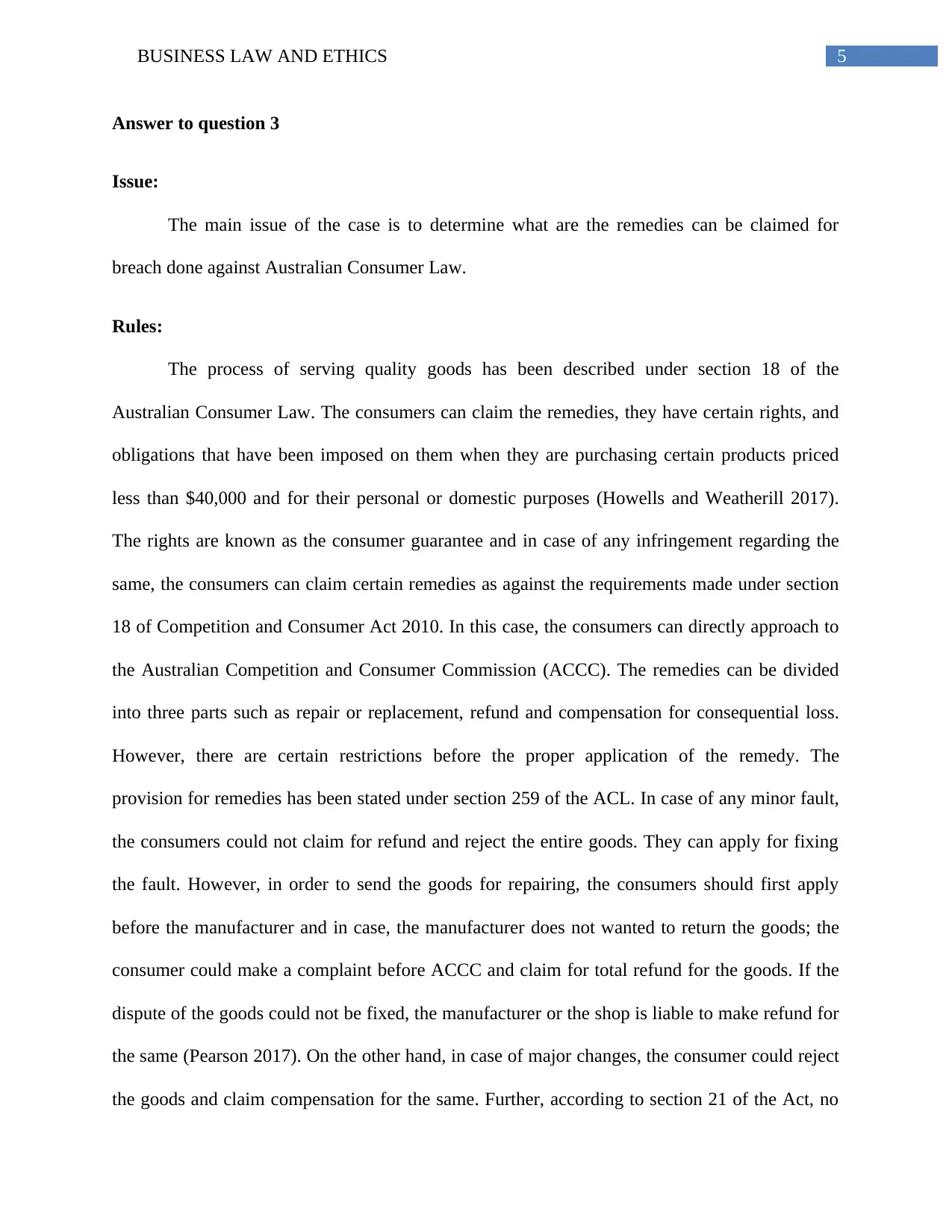
5BUSINESS LAW AND ETHICS
Answer to question 3
Issue:
The main issue of the case is to determine what are the remedies can be claimed for
breach done against Australian Consumer Law.
Rules:
The process of serving quality goods has been described under section 18 of the
Australian Consumer Law. The consumers can claim the remedies, they have certain rights, and
obligations that have been imposed on them when they are purchasing certain products priced
less than $40,000 and for their personal or domestic purposes (Howells and Weatherill 2017).
The rights are known as the consumer guarantee and in case of any infringement regarding the
same, the consumers can claim certain remedies as against the requirements made under section
18 of Competition and Consumer Act 2010. In this case, the consumers can directly approach to
the Australian Competition and Consumer Commission (ACCC). The remedies can be divided
into three parts such as repair or replacement, refund and compensation for consequential loss.
However, there are certain restrictions before the proper application of the remedy. The
provision for remedies has been stated under section 259 of the ACL. In case of any minor fault,
the consumers could not claim for refund and reject the entire goods. They can apply for fixing
the fault. However, in order to send the goods for repairing, the consumers should first apply
before the manufacturer and in case, the manufacturer does not wanted to return the goods; the
consumer could make a complaint before ACCC and claim for total refund for the goods. If the
dispute of the goods could not be fixed, the manufacturer or the shop is liable to make refund for
the same (Pearson 2017). On the other hand, in case of major changes, the consumer could reject
the goods and claim compensation for the same. Further, according to section 21 of the Act, no
Answer to question 3
Issue:
The main issue of the case is to determine what are the remedies can be claimed for
breach done against Australian Consumer Law.
Rules:
The process of serving quality goods has been described under section 18 of the
Australian Consumer Law. The consumers can claim the remedies, they have certain rights, and
obligations that have been imposed on them when they are purchasing certain products priced
less than $40,000 and for their personal or domestic purposes (Howells and Weatherill 2017).
The rights are known as the consumer guarantee and in case of any infringement regarding the
same, the consumers can claim certain remedies as against the requirements made under section
18 of Competition and Consumer Act 2010. In this case, the consumers can directly approach to
the Australian Competition and Consumer Commission (ACCC). The remedies can be divided
into three parts such as repair or replacement, refund and compensation for consequential loss.
However, there are certain restrictions before the proper application of the remedy. The
provision for remedies has been stated under section 259 of the ACL. In case of any minor fault,
the consumers could not claim for refund and reject the entire goods. They can apply for fixing
the fault. However, in order to send the goods for repairing, the consumers should first apply
before the manufacturer and in case, the manufacturer does not wanted to return the goods; the
consumer could make a complaint before ACCC and claim for total refund for the goods. If the
dispute of the goods could not be fixed, the manufacturer or the shop is liable to make refund for
the same (Pearson 2017). On the other hand, in case of major changes, the consumer could reject
the goods and claim compensation for the same. Further, according to section 21 of the Act, no
⊘ This is a preview!⊘
Do you want full access?
Subscribe today to unlock all pages.

Trusted by 1+ million students worldwide
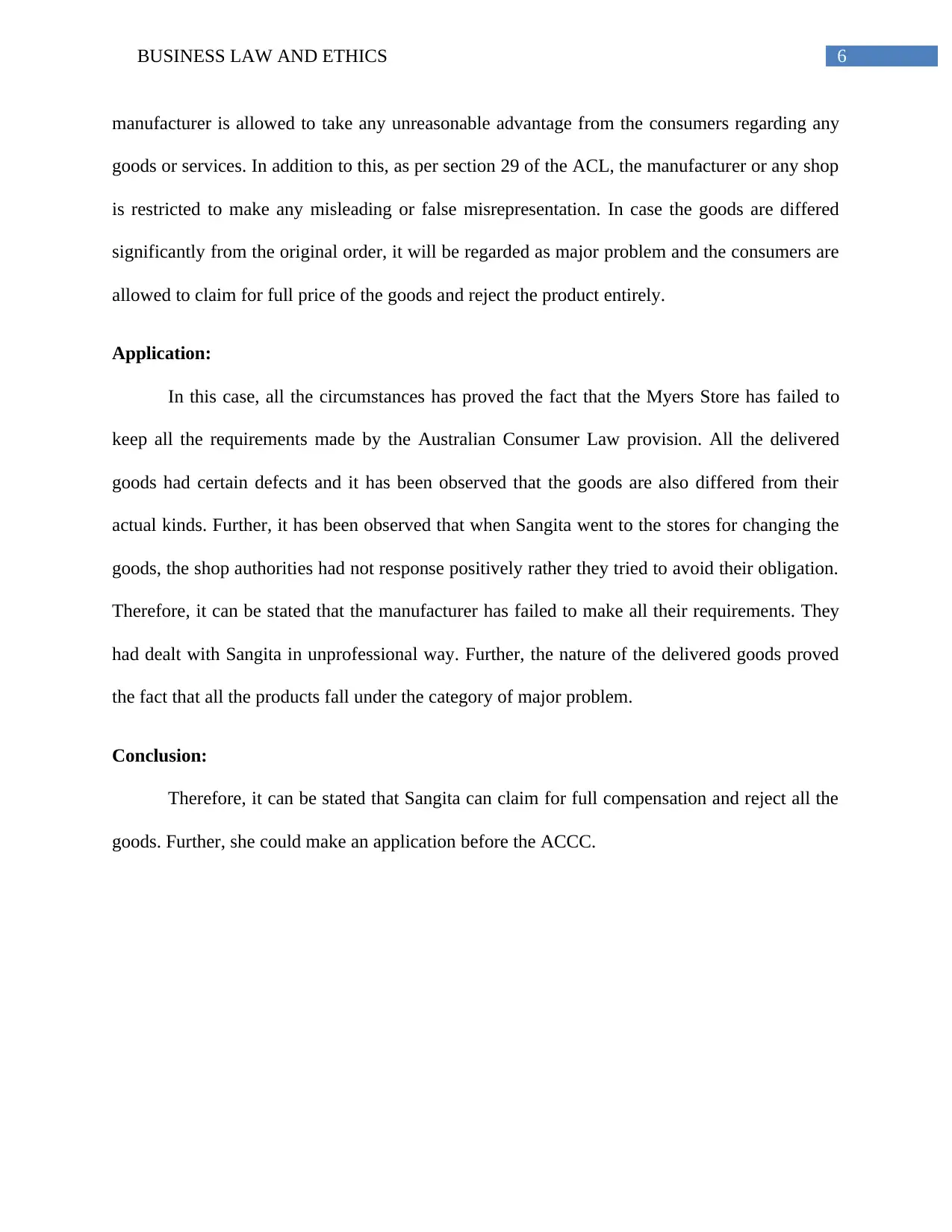
6BUSINESS LAW AND ETHICS
manufacturer is allowed to take any unreasonable advantage from the consumers regarding any
goods or services. In addition to this, as per section 29 of the ACL, the manufacturer or any shop
is restricted to make any misleading or false misrepresentation. In case the goods are differed
significantly from the original order, it will be regarded as major problem and the consumers are
allowed to claim for full price of the goods and reject the product entirely.
Application:
In this case, all the circumstances has proved the fact that the Myers Store has failed to
keep all the requirements made by the Australian Consumer Law provision. All the delivered
goods had certain defects and it has been observed that the goods are also differed from their
actual kinds. Further, it has been observed that when Sangita went to the stores for changing the
goods, the shop authorities had not response positively rather they tried to avoid their obligation.
Therefore, it can be stated that the manufacturer has failed to make all their requirements. They
had dealt with Sangita in unprofessional way. Further, the nature of the delivered goods proved
the fact that all the products fall under the category of major problem.
Conclusion:
Therefore, it can be stated that Sangita can claim for full compensation and reject all the
goods. Further, she could make an application before the ACCC.
manufacturer is allowed to take any unreasonable advantage from the consumers regarding any
goods or services. In addition to this, as per section 29 of the ACL, the manufacturer or any shop
is restricted to make any misleading or false misrepresentation. In case the goods are differed
significantly from the original order, it will be regarded as major problem and the consumers are
allowed to claim for full price of the goods and reject the product entirely.
Application:
In this case, all the circumstances has proved the fact that the Myers Store has failed to
keep all the requirements made by the Australian Consumer Law provision. All the delivered
goods had certain defects and it has been observed that the goods are also differed from their
actual kinds. Further, it has been observed that when Sangita went to the stores for changing the
goods, the shop authorities had not response positively rather they tried to avoid their obligation.
Therefore, it can be stated that the manufacturer has failed to make all their requirements. They
had dealt with Sangita in unprofessional way. Further, the nature of the delivered goods proved
the fact that all the products fall under the category of major problem.
Conclusion:
Therefore, it can be stated that Sangita can claim for full compensation and reject all the
goods. Further, she could make an application before the ACCC.
Paraphrase This Document
Need a fresh take? Get an instant paraphrase of this document with our AI Paraphraser
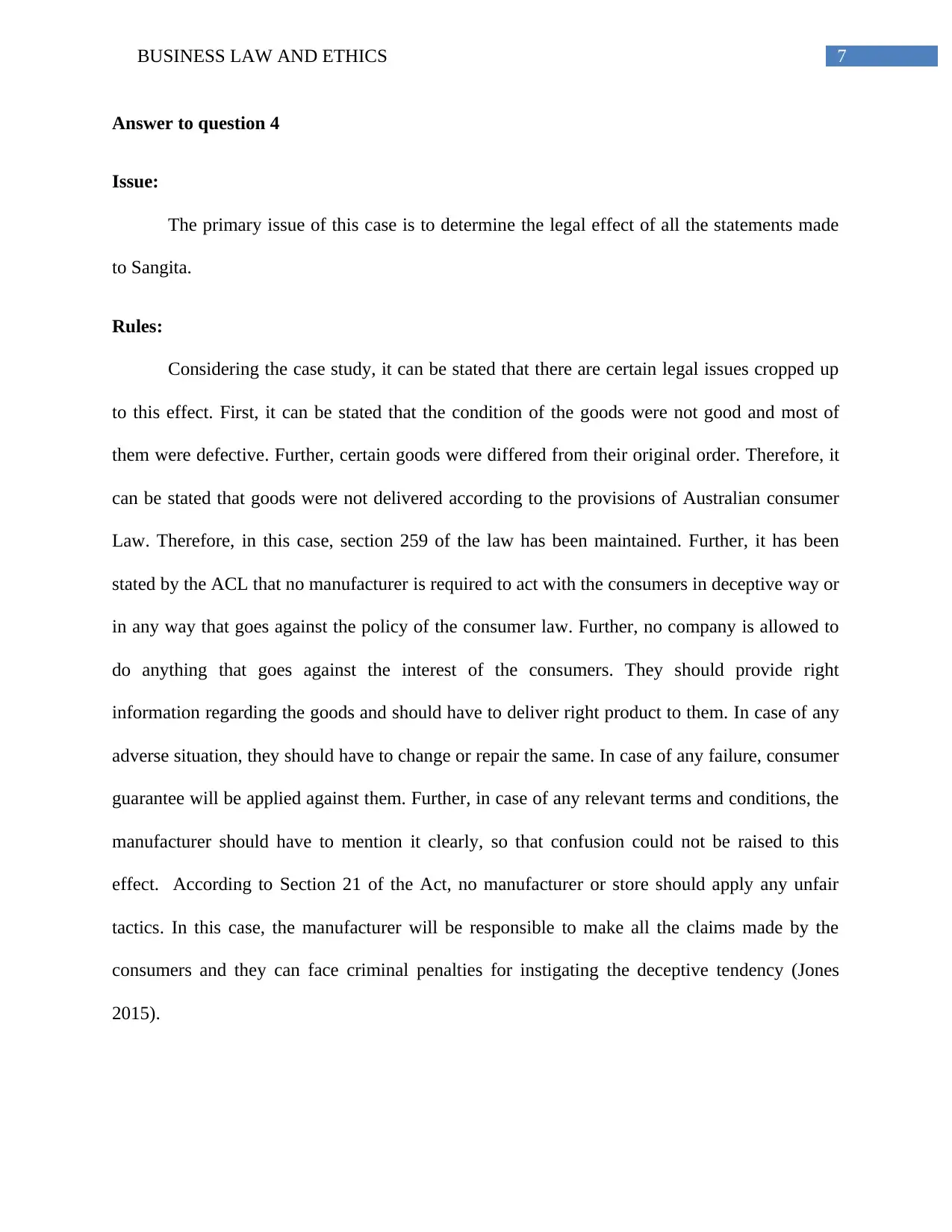
7BUSINESS LAW AND ETHICS
Answer to question 4
Issue:
The primary issue of this case is to determine the legal effect of all the statements made
to Sangita.
Rules:
Considering the case study, it can be stated that there are certain legal issues cropped up
to this effect. First, it can be stated that the condition of the goods were not good and most of
them were defective. Further, certain goods were differed from their original order. Therefore, it
can be stated that goods were not delivered according to the provisions of Australian consumer
Law. Therefore, in this case, section 259 of the law has been maintained. Further, it has been
stated by the ACL that no manufacturer is required to act with the consumers in deceptive way or
in any way that goes against the policy of the consumer law. Further, no company is allowed to
do anything that goes against the interest of the consumers. They should provide right
information regarding the goods and should have to deliver right product to them. In case of any
adverse situation, they should have to change or repair the same. In case of any failure, consumer
guarantee will be applied against them. Further, in case of any relevant terms and conditions, the
manufacturer should have to mention it clearly, so that confusion could not be raised to this
effect. According to Section 21 of the Act, no manufacturer or store should apply any unfair
tactics. In this case, the manufacturer will be responsible to make all the claims made by the
consumers and they can face criminal penalties for instigating the deceptive tendency (Jones
2015).
Answer to question 4
Issue:
The primary issue of this case is to determine the legal effect of all the statements made
to Sangita.
Rules:
Considering the case study, it can be stated that there are certain legal issues cropped up
to this effect. First, it can be stated that the condition of the goods were not good and most of
them were defective. Further, certain goods were differed from their original order. Therefore, it
can be stated that goods were not delivered according to the provisions of Australian consumer
Law. Therefore, in this case, section 259 of the law has been maintained. Further, it has been
stated by the ACL that no manufacturer is required to act with the consumers in deceptive way or
in any way that goes against the policy of the consumer law. Further, no company is allowed to
do anything that goes against the interest of the consumers. They should provide right
information regarding the goods and should have to deliver right product to them. In case of any
adverse situation, they should have to change or repair the same. In case of any failure, consumer
guarantee will be applied against them. Further, in case of any relevant terms and conditions, the
manufacturer should have to mention it clearly, so that confusion could not be raised to this
effect. According to Section 21 of the Act, no manufacturer or store should apply any unfair
tactics. In this case, the manufacturer will be responsible to make all the claims made by the
consumers and they can face criminal penalties for instigating the deceptive tendency (Jones
2015).
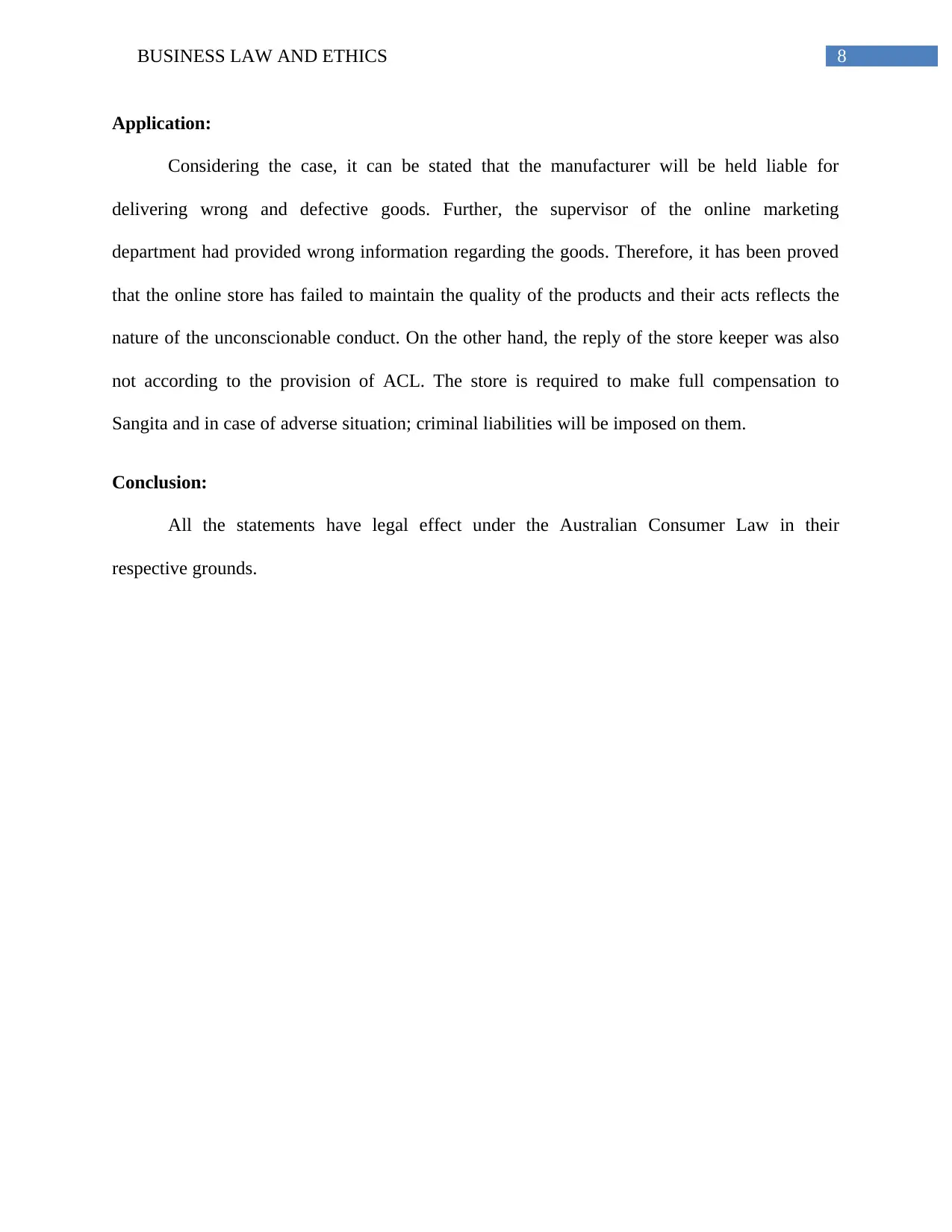
8BUSINESS LAW AND ETHICS
Application:
Considering the case, it can be stated that the manufacturer will be held liable for
delivering wrong and defective goods. Further, the supervisor of the online marketing
department had provided wrong information regarding the goods. Therefore, it has been proved
that the online store has failed to maintain the quality of the products and their acts reflects the
nature of the unconscionable conduct. On the other hand, the reply of the store keeper was also
not according to the provision of ACL. The store is required to make full compensation to
Sangita and in case of adverse situation; criminal liabilities will be imposed on them.
Conclusion:
All the statements have legal effect under the Australian Consumer Law in their
respective grounds.
Application:
Considering the case, it can be stated that the manufacturer will be held liable for
delivering wrong and defective goods. Further, the supervisor of the online marketing
department had provided wrong information regarding the goods. Therefore, it has been proved
that the online store has failed to maintain the quality of the products and their acts reflects the
nature of the unconscionable conduct. On the other hand, the reply of the store keeper was also
not according to the provision of ACL. The store is required to make full compensation to
Sangita and in case of adverse situation; criminal liabilities will be imposed on them.
Conclusion:
All the statements have legal effect under the Australian Consumer Law in their
respective grounds.
⊘ This is a preview!⊘
Do you want full access?
Subscribe today to unlock all pages.

Trusted by 1+ million students worldwide
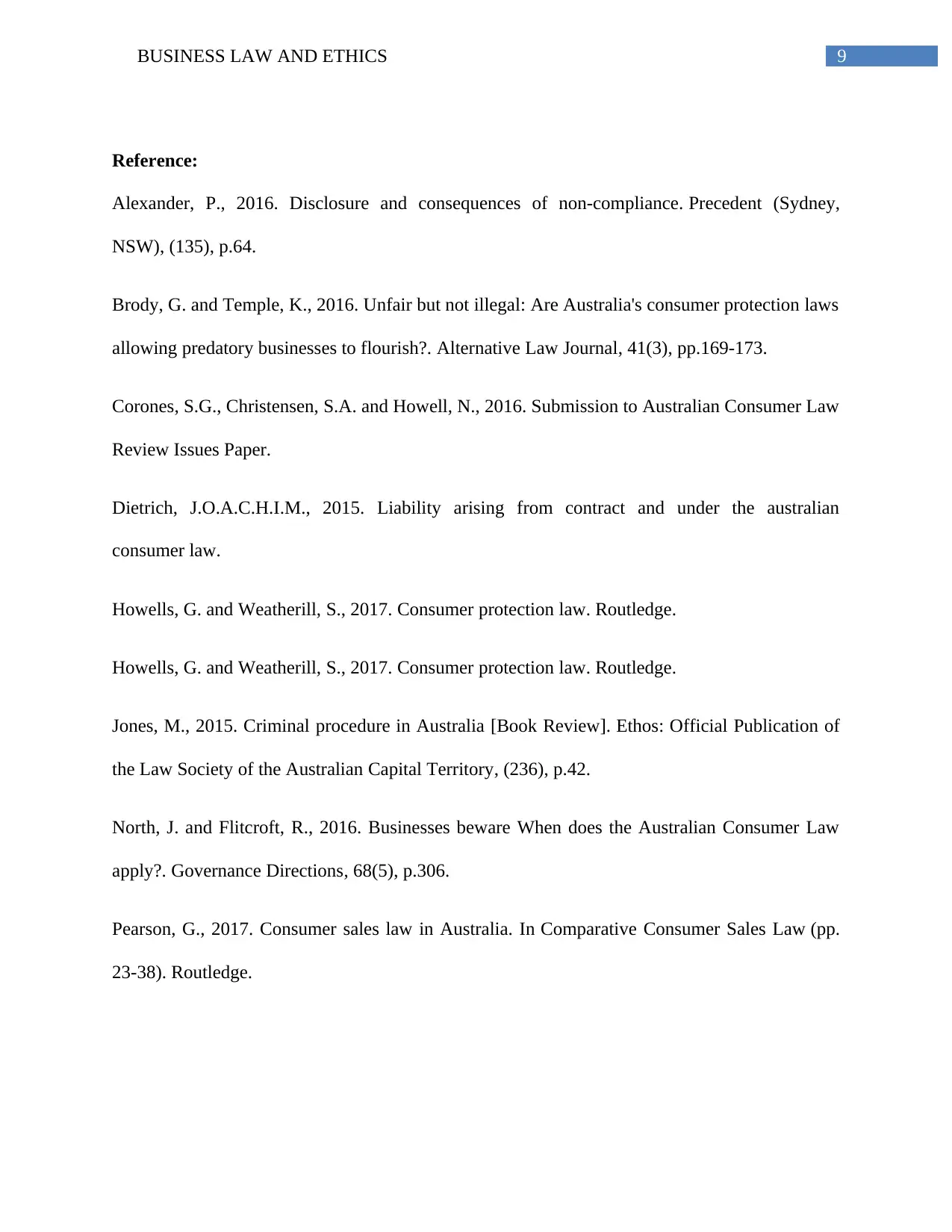
9BUSINESS LAW AND ETHICS
Reference:
Alexander, P., 2016. Disclosure and consequences of non-compliance. Precedent (Sydney,
NSW), (135), p.64.
Brody, G. and Temple, K., 2016. Unfair but not illegal: Are Australia's consumer protection laws
allowing predatory businesses to flourish?. Alternative Law Journal, 41(3), pp.169-173.
Corones, S.G., Christensen, S.A. and Howell, N., 2016. Submission to Australian Consumer Law
Review Issues Paper.
Dietrich, J.O.A.C.H.I.M., 2015. Liability arising from contract and under the australian
consumer law.
Howells, G. and Weatherill, S., 2017. Consumer protection law. Routledge.
Howells, G. and Weatherill, S., 2017. Consumer protection law. Routledge.
Jones, M., 2015. Criminal procedure in Australia [Book Review]. Ethos: Official Publication of
the Law Society of the Australian Capital Territory, (236), p.42.
North, J. and Flitcroft, R., 2016. Businesses beware When does the Australian Consumer Law
apply?. Governance Directions, 68(5), p.306.
Pearson, G., 2017. Consumer sales law in Australia. In Comparative Consumer Sales Law (pp.
23-38). Routledge.
Reference:
Alexander, P., 2016. Disclosure and consequences of non-compliance. Precedent (Sydney,
NSW), (135), p.64.
Brody, G. and Temple, K., 2016. Unfair but not illegal: Are Australia's consumer protection laws
allowing predatory businesses to flourish?. Alternative Law Journal, 41(3), pp.169-173.
Corones, S.G., Christensen, S.A. and Howell, N., 2016. Submission to Australian Consumer Law
Review Issues Paper.
Dietrich, J.O.A.C.H.I.M., 2015. Liability arising from contract and under the australian
consumer law.
Howells, G. and Weatherill, S., 2017. Consumer protection law. Routledge.
Howells, G. and Weatherill, S., 2017. Consumer protection law. Routledge.
Jones, M., 2015. Criminal procedure in Australia [Book Review]. Ethos: Official Publication of
the Law Society of the Australian Capital Territory, (236), p.42.
North, J. and Flitcroft, R., 2016. Businesses beware When does the Australian Consumer Law
apply?. Governance Directions, 68(5), p.306.
Pearson, G., 2017. Consumer sales law in Australia. In Comparative Consumer Sales Law (pp.
23-38). Routledge.
Paraphrase This Document
Need a fresh take? Get an instant paraphrase of this document with our AI Paraphraser
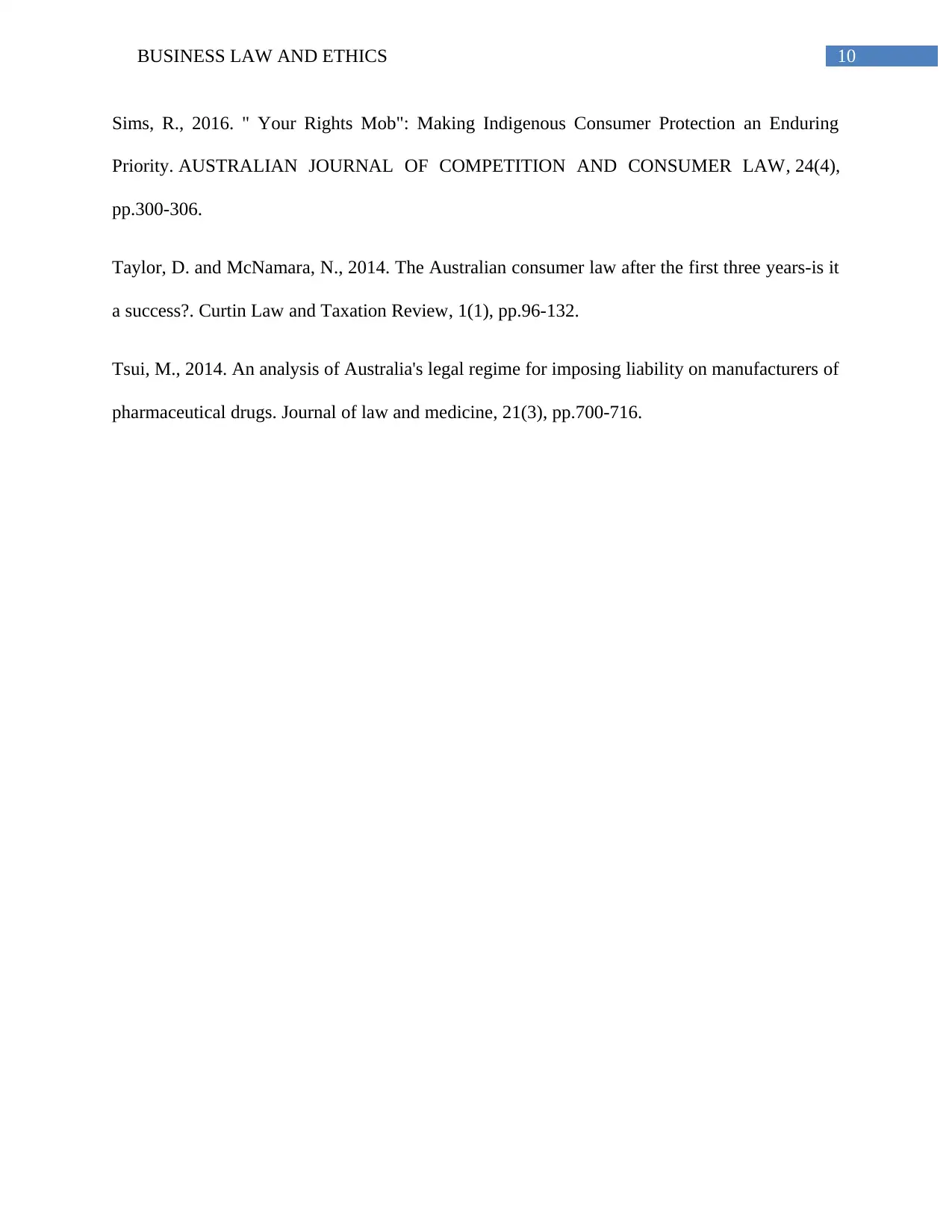
10BUSINESS LAW AND ETHICS
Sims, R., 2016. " Your Rights Mob": Making Indigenous Consumer Protection an Enduring
Priority. AUSTRALIAN JOURNAL OF COMPETITION AND CONSUMER LAW, 24(4),
pp.300-306.
Taylor, D. and McNamara, N., 2014. The Australian consumer law after the first three years-is it
a success?. Curtin Law and Taxation Review, 1(1), pp.96-132.
Tsui, M., 2014. An analysis of Australia's legal regime for imposing liability on manufacturers of
pharmaceutical drugs. Journal of law and medicine, 21(3), pp.700-716.
Sims, R., 2016. " Your Rights Mob": Making Indigenous Consumer Protection an Enduring
Priority. AUSTRALIAN JOURNAL OF COMPETITION AND CONSUMER LAW, 24(4),
pp.300-306.
Taylor, D. and McNamara, N., 2014. The Australian consumer law after the first three years-is it
a success?. Curtin Law and Taxation Review, 1(1), pp.96-132.
Tsui, M., 2014. An analysis of Australia's legal regime for imposing liability on manufacturers of
pharmaceutical drugs. Journal of law and medicine, 21(3), pp.700-716.
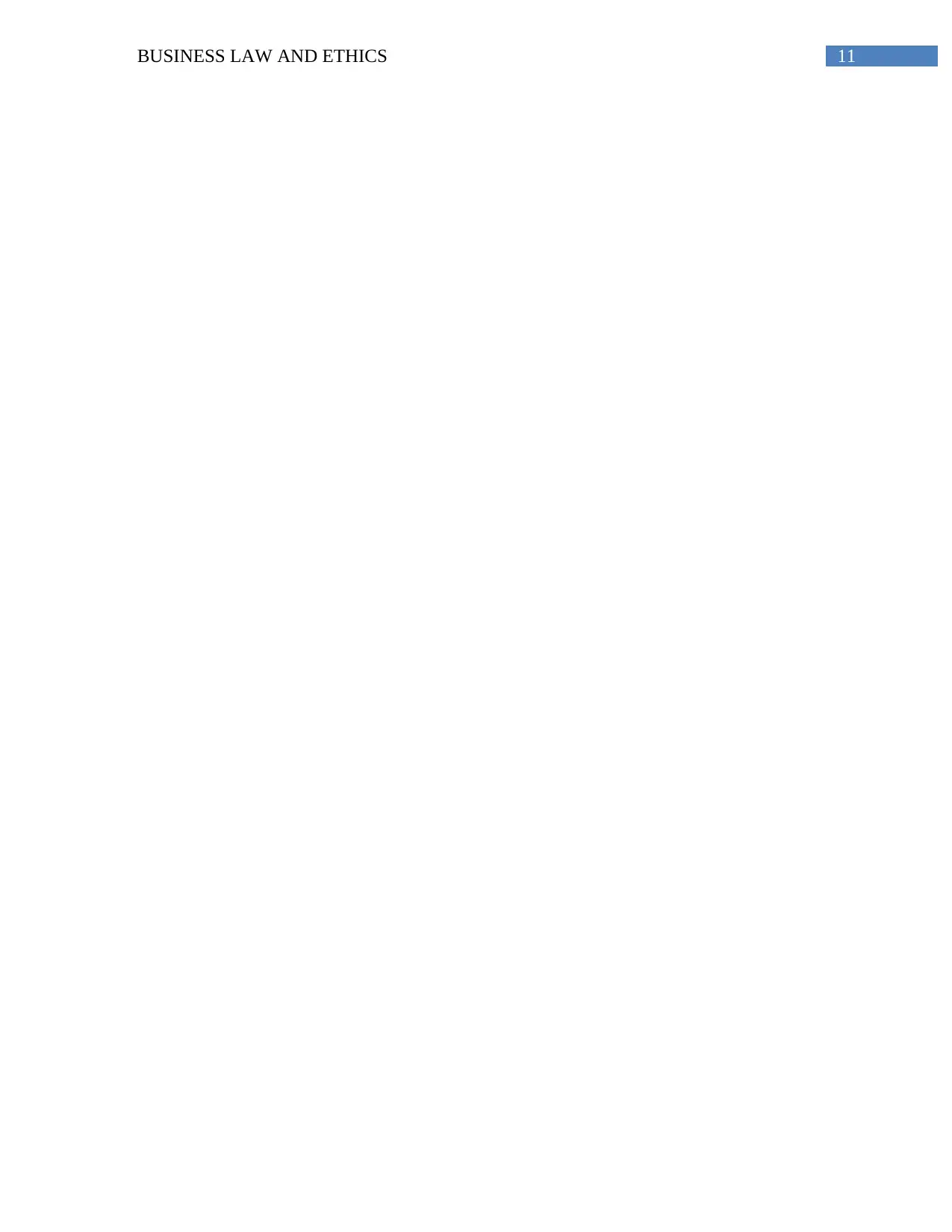
11BUSINESS LAW AND ETHICS
⊘ This is a preview!⊘
Do you want full access?
Subscribe today to unlock all pages.

Trusted by 1+ million students worldwide
1 out of 12
Related Documents
Your All-in-One AI-Powered Toolkit for Academic Success.
+13062052269
info@desklib.com
Available 24*7 on WhatsApp / Email
![[object Object]](/_next/static/media/star-bottom.7253800d.svg)
Unlock your academic potential
Copyright © 2020–2026 A2Z Services. All Rights Reserved. Developed and managed by ZUCOL.





